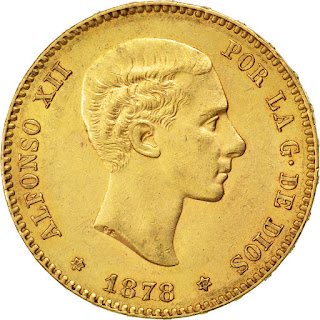Spain 25 Pesetas Gold Coin 1878 King Alfonso XII
Obverse: Bust of King Alfonso XII as constitutional King of Spain right.
Legend: ALFONSO XII POR LA G. DE DIOS (19) 1878 (62)
Reverse: Crowned draped Spanish Coat of Arms in Collar of the Golden Fleece; "REY CONSTL. DE ESPAÑA" above, "25 PESETAS" below, D·E· below left and ·M· below right.
Legend: REY CONSTL. DE ESPANA (D.E.) 25 PESETAS (.M.)
Assayer Mark - DE M: Eduardo Díaz Pimienta - Julio de Escosura Tablares - Ángel Mendoza Ordoñez.
Composition: Gold.
Fineness: 0.900.
Weight: 8.0645 g.
AGW: 0.2333 oz.
King Alfonso XII of Spain
Alfonso XII, (born November 28, 1857, Madrid, Spain — died November 25, 1885, Madrid), Spanish king whose short reign (1874–1885) gave rise to hopes for a stable constitutional monarchy in Spain.
The eldest surviving son of Queen Isabella II and, presumably, her consort, the duque de Cádiz, Alfonso accompanied his mother into exile following her deposition by the revolution of September 1868. He received his education at the Theresianum in Vienna and at the Royal Military College, Sandhurst, England. Isabella abdicated her rights in his favour in June 1870, but it was not until four years later (December 29, 1874) that Alfonso was proclaimed king of Spain. He returned to his country early in January of the following year.
For most of Alfonso’s reign Spain enjoyed an unaccustomed tranquillity. The pattern of political life was determined by Antonio Cánovas del Castillo, Alfonso’s prime minister from 1875 to 1881 and again from 1884 to 1885. The two most urgent problems — ending the civil war unleashed by the Carlists, the partisans of the successors to the Spanish throne in the male line, and drafting the constitution — were both settled in 1876. In addition, the Convention of Zanjón established peace in Cuba after the Ten Years’ War. In January 1878 Alfonso married María de las Mercedes, daughter of the duc de Montpensier. She died six months later, and the following year the king married a daughter of the archduke Charles Ferdinand of Austria, María Cristina, by whom he had two daughters and a son, who became King Alfonso XIII.
Although politically inexperienced, Alfonso XII demonstrated great natural tact and sound judgment, qualities that gave rise to hope that the monarchy would not suffer if the constitution enacted in 1876 were fully implemented. Attempts on the king’s life (October 1878 and December 1879) and a military pronunciamiento against the regime (1883) were not indicative of any general discontent with the restored monarchy; on the contrary, Alfonso enjoyed considerable popularity, and his early death from tuberculosis was a great disappointment to those who looked forward to a constitutional monarchy in Spain.

